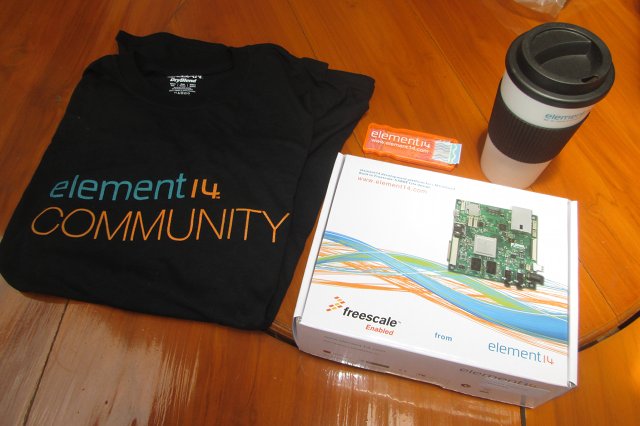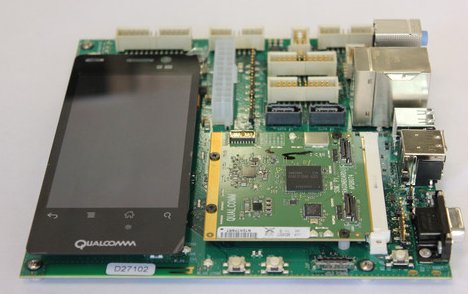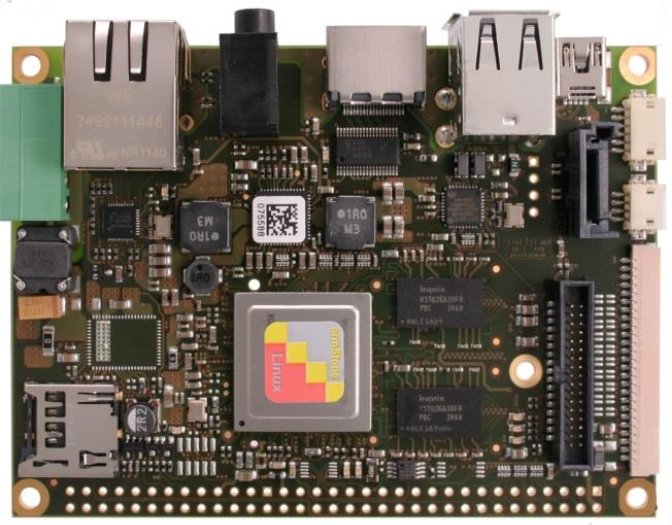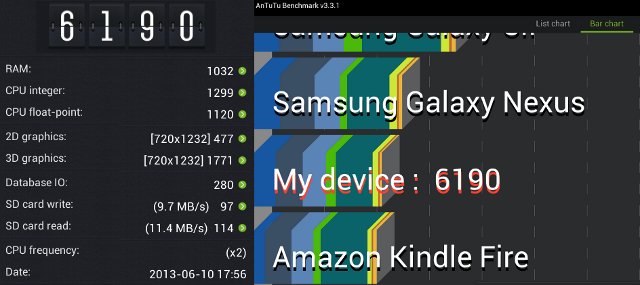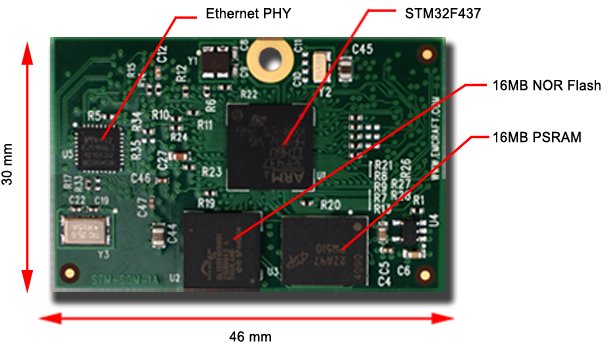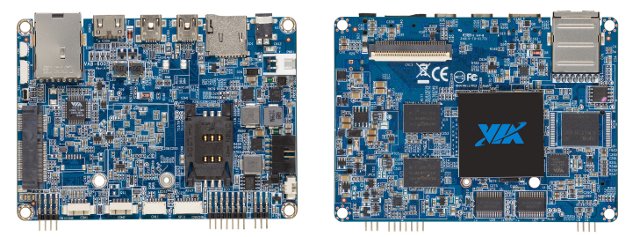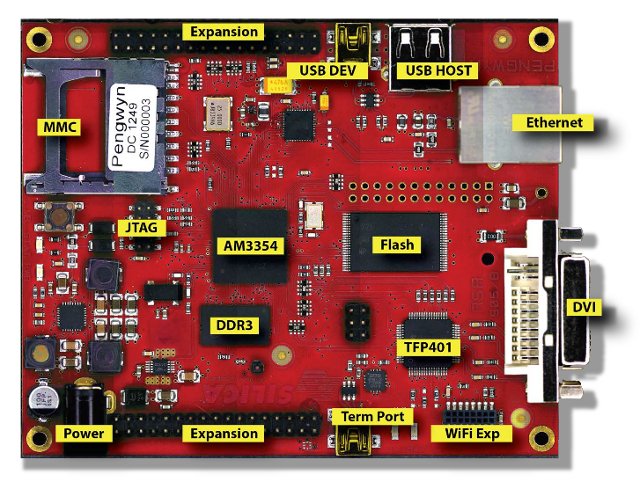Freescale SABRE Lite is a development board powered by i.MX6 Quad processor with 1GB RAM, SATA, GbE Ethernet, and more. You can get SABRE Lite specifications in my first post about the board. I recently participated in Element14’s “brainteaser” competition for the 4th birthday of their community, where the company offered 9 SABRE Lite development kit to randomly selected participants, and I got lucky. The board can be purchased for $179 from Element14 (MCIMX6Q-SL). I’ll start by showing what in the package, followed by a side-by-side comparison with Wandboard Quad, and show how to getting started by following the Quick Start Guide provided with the board. SABRE Lite i.MX6 Development Kit Unboxing I received the board about 5 days after I provided my address in a large staple carton box with a few goodies. Beside SABRE Lite devkit, the package comes with Element14’s T-Shirt (not my size), double walled tumbler, […]
Intrinsyc Announces DragonBoard 8074 Devkit Based on Qualcomm Snapdragon 800 APQ8074 Processor
Intrinsyc Software has announced the availability of a new DragonBoard Development Kit composed of a Qseven Open-Q 8074 SoM powered by Qualcomm Snapdragon 800 APQ8074 processor for Android and embedded Linux development, and a mini-ITX carrier board. The kit is designed to help with developing applications such as ruggedized tablets, digital signage, applications for government/public safety, health care, robotics, wearable displays and video streaming/conferencing. Specifications of DragonBoard 8074 Kit: SoC – Qualcomm Snapdragon 800 (APQ8074) quad core Krait 400 CPU @ 2.3 GHz with Adreno 330 GPU and Hexagon v5 QDSP6 @ 600MHz System Memory – 2GB LPDDR3 RAM Storage – 16GB eMMC flash + micro SD slot + 2x SATA Display – qHD LCD capacitive touchscreen Connectivity: Gigabit Ethernet Wi-Fi 802.11n/ac Bluetooth 4.0 GNSS (GPS and GLONASS) Other I/O: USB – 2x USB 3.0 + 2x USB 2.0 + micro-AB USB OTG Video Output – HDMI Audio – 5.1 […]
F&S armStoneA9 is a Pico-ITX Board Powered by Freescale i.MX 6 with up to 4GB RAM
F&S Elektronik Systeme GmbH has announced the armstoneA9, a pico-ITX board featuring Freescale i.MX 6 Solo/Dual or Quad Cortex A9 processor with up to 4GB DDR3 SDRAM, and 128 MB flash (1GB+ flash optional) that available in both commercial and industrial temperature range. Here are the specifications of the board: SoC – Freescale i.MX 6 Cortex-A9 (Quad-/ Dual-/ Single-Core) @ 800 MHz to 1 GHz with Vivante GPU System Memory – 1GB (standard version) to 4 GB DDR3 SDRAM Storage – 128MB Flash (1GB+ optional), micro-SD Card Slot, and SATA interface Display: up to SVGA (800 x 600, 65536 colors) via RGB up to WUXGA (1920 x 1200, 18Bit/ 24Bit) via 2x LVDS up to FullHD (1920 x 1080, 24Bit) via HDMI Touch Panel – 4-wire, analogue resistive and PCAP-Touch Interface via I2C Interfaces: 1x 10/100/1000MBit Ethernet 3x Serial (2x RS232, 1x TTL 3.3V Level) 1x USB 2.0 Host, 1x […]
Wandboard Dual Benchmarks, Serial Console Fun, and Distributions List
Since last time I tried Android and Ubuntu on the Wandboard, a few things happened. I’m not talking about Wandboard Quad announcement, but instead I received a Class 10 SD card, which makes the system so much responsive, and a RS232 to USB adapter so that I can access the serial console. So today, I’ll publish some benchmark results on Wandboard Dual since none appear to be available, and play a little with the serial console. A few things also happened on the operating systems side with more distributions now available for the board. Prerequisites I ran benchmark in Android, so I installed the latest Android 4.1.2 image (11th of April 2012) to my new SD card (ADATA 16 GB Class 10), and contrary to my poor experience on a 4GB Class 4 micro SD, everything was very fluid. I’ve also installed Google Play in order to install the applications. […]
Emcraft Systems STM32F4 SoM and Starter Kit Run uCLinux From On-Chip Flash
Emcraft has recently announced a new system-on-module based on STMicro STM32F437 Cortex M4 micro-controller, as well as a starter kit based on the module that can run uCLinux directly from STM32F437’s 2MB on-chip flash, allowing a faster boot time, and AFAIK, this is the only Linux-ready STM32 platform available on the market. Here are the specifications of Emcraft Systems SOM-STM32F4: MCU – STMicro STM32F437 Cortex M4 @ 168 MHz with 256KB RAM and 2MB flash External Memory – 16MB PSRAM External Storage – 16MB NOR Flash Ethernet PHY (Optional) Connectors – 2x SoM Connectors with access to I/Os: USB, Ethernet, I2C, SPI, UART, LCD I/F, ADC, DAC, GPIO… Dimensions – 30 mm x 46 mm To speed-up development and for evaluation, the company also provides a starter kit composed of the STM32F4 SoM, and a baseboard (SOM-BSB-EXT) with the following main features: USB interface using USB-UART bridge connected to UART […]
VIA Unveils VAB-600 Pico-ITX Board Powered by WM8950 Processor
VIA Technologies has recently announced the VAB-600 Pico-ITX embedded board featuring WonderMedia WM8950 ARM Cortex A9 SoC clocked at 800MHz. VIA targets in-vehicle infotainment as well as mobile and healthcare applications for the board despite an operating temperature range between 0°C and 60°C. Here are the key features of this embedded board: SoC – Wondermedia WM8950 Cortex-A9 @ 800MHz + Mali-400 GPU System Memory – 1GB DDR3 SDRAM Storage – 4GB eMMC Flash memory + 512KB SPI Flash for Boot Loader + microSD slot Video Output – Mini HDMI, on-board DVO (Digital Video Output) for TTL or LVDS display Video Codecs – MPEG2 MP@HL, MPEG4, H.264 BP/MP/[email protected], VC-1 SP/MP/AP, VP8 and JPEG/MJPEG. USB – 2x mini USB 2.0 host ports Connectivity – 10/100M Ethernet (VT6113), 3G (SIM card slot) and optional WiFi support (VIA VNT9271B6050 WiFi module shared with one USB port) On-board Connectors: 2x COM connectors 1x RTC battery […]
Yocto Project 1.4 “Dylan” Release
The Yocto Project Release 1.4 has just been announced. This release codenamed “Dylan” and based on Poky 9.0.0 is the sixth release of the project. The Yocto Project is a framework that creates embedded Linux distributions, and has been getting more and more traction with silicon vendors such as Intel, Freescale and Texas Instruments. Yocto Project 1.4 bring the following new features and updates: Major performance improvements – The overall build time has been reduced by more than 10%. Kernel build time is reduced by about 25%. With rm_work enabled, 40% less storage will be used for the tmp directory. Smart, a replacement for zypper Support for read-only rootfs Wayland support, an X replacement. Systemd support, a replacement for the system V init daemon. Usability improvements to HOB, bitbake, yocto-bsp and other tools, including UI improvements, new features and bug fixes. Documentation improvement/update and a new kernel development manual and […]
SILICA Pengwyn Low Cost Open Industrial Development Platform Powered by Sitara AM3354 Processor
At the end of January, SILICA, an Avnet subsidiary, announced the Pengwyn, a single board computer based on Texas Instruments Sitara AM3354 Cortex A8 processor. The board targets industrial customers, and the company promotes it as “an open platform to develop applications under Linux or Windows Embedded operating systems”. Here are the specifications of the Pengwyn board: Texas Instruments Sitara AM 3354 ARM Cortex-A8 MCU @ 720 MHz System Memory – 256 MB DDR3 Storage – 1 GB Nand Flash, 32 MB SPI Flash Memory, and microSD slot (if not used with Wi-Fi/Bt modules) Connectivity and expandability USB Host and Device Ports RJ-45 Ethernet Port Connector for optional 1 GB Ethernet Port 2x connectors for generic expansions modules SDIO/MMC Port (can be used for optional WI-FI/bluetooth modules) DVI Display Port Silica will provide Linux (Arago Project, an OpenEmbedded based Distribution) and Windows Embedded Compact 7 BSP and images, as well as […]


